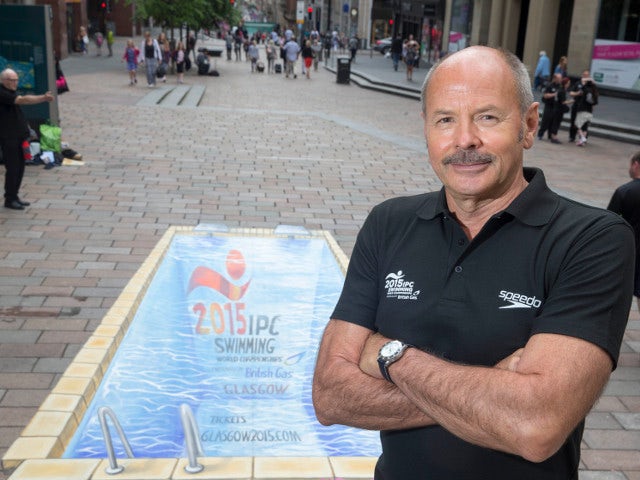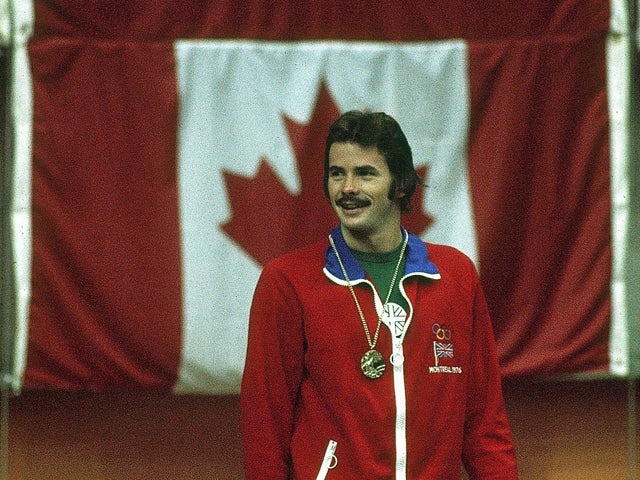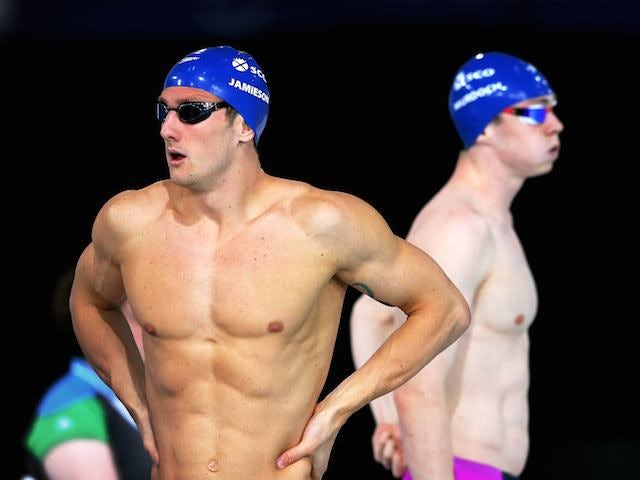Being the only person to have held British, American, Commonwealth, European, World and Olympic swimming titles at the same time, David Wilkie is no stranger to success.
The former breaststroke specialist claimed an Olympic gold medal in a world-record time in 1976, but he will be on the other side of the pool when the IPC Swimming World Championships roll into Glasgow on July 13.
Ellie Simmonds will lead Great Britain's 18-strong team into the para-swimming event at Tollcross, where last year Wilkie's fellow Scotsman Michael Jamieson failed to claim gold in the 200m breaststroke final at the Commonwealth Games.
After unveiling a 3D street art swimming pool promoting the IPC Worlds, Wilkie spoke to Sports Mole about Tollcross's unique atmosphere, Britain's hopes for the meet, and if Jamieson can get back to winning ways.

Firstly, how pleased are you that Glasgow is hosting another big meet, especially after the success of the Commonwealth Games last year?
"Well it's beginning to get known for swimming now. It's incredible to think that Glasgow, which apart from the Commonwealth Games wasn't really looked upon as a city that had that many sporting events apart from soccer. Of course it's had events on before, but it's great to see my sport getting some attention, so the IPC Swimming World Championships is another one and I think in a couple of years, they're also having the European Championships in swimming, so it's good and long may it continue."
You were in plenty of pressure situations in your swimming career. Do you think it's an advantage to have a home crowd or could that pile the pressure on, or does it simply depend on the swimmer?
"Yes, it depends really on the swimmer. I think for me, to be in front of a home crowd certainly does help because they're going to be a lot noisier and there's going to be a lot more backing in the pool. The atmosphere that they create is certainly going to spur you on. It works both ways - it puts the pressure on you, but that pressure is usually pretty positive and that's what sports people need. They need a lot of noise, they need the decimal level raised up because that makes you feel more important. When you swim or run in front of your home crowd, you just feel a bit special."
Do you think that the fact that doing well here could also earn the swimmers a spot in the Rio Paralympics will add to the intensity and competitiveness that we'll see at Tollcross?
"Yeah, any sport is like a building block - once you've achieved a success in, let's say the Commonwealth Games, then you look at the Europeans and then you work back to the World Championships. Once you've got that of course, then the big boy is the Olympic Games and that's what we all want to achieve whether we're Paralympians or Olympians. It's a process of improvement and we all have our own levels of attainment but we all want to get the Olympic gold medal - that's usually the elusive one that everybody's after."
 © Getty Images
© Getty Images
Bethany Firth recently confirmed that she's been forced to pull out with a wrist injury - given that she's world-record holder in all four of her events, it's a big blow to lose her isn't it?
"I think when you have any class athlete coming out of an event, especially World Championships, it's tough for the team and it's tough for the public - they want to see people with proven ability, they want to see world-record holders, that's what it's all about. [The public] want to see people improving on their times and see them doing something special. If you're part of that, you want to say 'I was there when that happened', so it is a shame when great athletes for some reason or for injuries can't make an event."
It's an impressive field this year. Ellie Simmonds is leading the way for Britain and she's pretty much been the face of British para-swimming for some time. Do you feel that she can add to her success in Glasgow?
"I would hope so. You look at the athletes that have done so well prior to the World Championships and this is another stepping stone to another level of success. I'm sure the British swimmers and the rest of the world will come here and perform to the best of their ability, and it's a good pool, Tollcross. It's a nice pool because it has plenty of atmosphere, it's a nice warm pool and it's got a crowd that's very close to the actual event."
And I'm sure you'll be taking a particular interest in the Scottish contingent of Scott Quin and Andrew Mullen?
"Yes, Scott's a breaststroker like I was. He's at Warrender Baths Club [in Edinburgh] and I was a member of that swimming club too, so I'll be paying a particular interest in Scott and I just said to him 'you need to swim probably about a 66 and improve a second on your time to win a gold medal'. He feels pretty confident that he can do that."
I also want to get your thoughts on Michael Jamieson. He had quite a poor 12 months which resulted in him missing out on a place in the GB lineup for the World Championships. How disappointed were you for him when he failed to win gold at the Commonwealth Games last year?
"I think that totally threw him. I think Michael was expecting himself to turn up, swim four laps fast and to get that gold medal, but then you had Ross Murdoch who didn't allow him to do that. He swam a better race and won it. I think that totally shocked Michael and the great thing about sport is that it's a great equaliser - you don't just turn up to an event and get given a medal on a plate.
"You've got to earn that medal and I think Michael was truly shocked and it did him a mental disservice in terms of that he just did not expect that to happen. When you're an athlete in your peak and something like that happens, it knocks you off your pedestal and it takes some time to evaluate as a person and as an athlete, so I don't think that we can really understand what a tough event that was for him.
 © Getty Images
© Getty Images
"He's still swimming, maybe I'm dramatising this a little too much, but he's still swimming at a high level and ticking the right box, but he didn't make the World Championships this year and he's got the Olympics coming up pretty fast in 2016. Will he make that? It's really watch this space."
You mentioned Ross Murdoch there - in contrast to Jamieson, he's really caught the attention. Do you think that he has the potential to become one of Scotland's greats, like yourself?
"Absolutely! He's a nice guy, he's a good athlete, he's turned into a world-class swimmer. He's performing at the highest level and now the question will be asked, can he continue his improvement to Rio? Everything is stacking up nicely for him - the British breaststroke team is so strong, the competition is immense.
"I think that's great for all the swimmers because that particular discipline, we've always done well in breaststroke, but it puts pressure on all those swimmers to just train a little bit harder because they know if they don't put the training in, they know if they don't get the edge, they ain't going to make that team, so it's good because it's going to produce some great races and it's going to produce some great athletes."
In your prime, how do you think you would have fared alongside today's crop of swimmers?
"I suppose the times that I was doing 40 years ago don't really stack up, but in terms of ability and mental strength etc, I'd be thrashing the lot of them! I'd be up there with them. In all seriousness, it's about competing at a high level and I competed and won everything, so I'm very happy with my achievements."
Other sports, like football for example, have changed so much over the years in terms training regimes, diet and so on. Throughout the years have you noticed similar changes in swimming?
"Yes, sport has evolved as it's got more professional and more commercial. Coaching has evolved with it, swimmers have evolved themselves, the diet has got better, the preparation and psychology has improved. Guys now have got everything handed to them, if they want it, on a plate. They can travel to countries to do warm-weather training, they can get special nutritionists and finance from their sponsor etc.
"They live in a spoilt world compared to what we lived in. It was tough and we had to really get off our own backsides and do it ourselves. Saying that though, they're still the same people, they're still having to do the race themselves and get that sort of readiness before they stand on the blocks. There's only one person out there apart from seven other competitors. It's easier, but it's just as tough."








